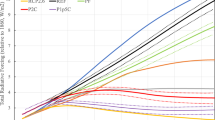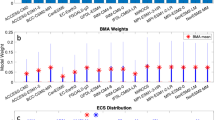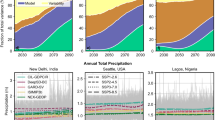Abstract
As they gain new users, climate change mitigation scenarios are playing an increasing role in transitions to net zero. One promising practice is the analysis of scenario ensembles. Here we argue that this practice has the potential to bring new and more robust insights compared with the use of single scenarios. However, several important aspects have to be addressed. We identify key methodological challenges and the existing methods and applications that have been or can be used to address these challenges within a three-step approach: (1) pre-processing the ensemble; (2) selecting a few scenarios or analysing the full ensemble; and (3) providing users with efficient access to the information.
This is a preview of subscription content, access via your institution
Access options
Access Nature and 54 other Nature Portfolio journals
Get Nature+, our best-value online-access subscription
$29.99 / 30 days
cancel any time
Subscribe to this journal
Receive 12 print issues and online access
$209.00 per year
only $17.42 per issue
Buy this article
- Purchase on Springer Link
- Instant access to full article PDF
Prices may be subject to local taxes which are calculated during checkout




Similar content being viewed by others
References
Bauer, N. et al. Global energy sector emission reductions and bioenergy use: overview of the bioenergy demand phase of the EMF-33 model comparison. Climatic Change 163, 1553–1568 (2020).
Kriegler, E. et al. The role of technology for achieving climate policy objectives: overview of the EMF 27 study on global technology and climate policy strategies. Climatic Change 123, 353–367 (2014).
Riahi, K. et al. The Shared Socioeconomic Pathways and their energy, land use, and greenhouse gas emissions implications: an overview. Glob. Environ. Change 42, 153–168 (2017).
Roelfsema, M. et al. Taking stock of national climate policies to evaluate implementation of the Paris Agreement. Nat. Commun. 11, 2096 (2020).
Schaeffer, R. et al. Comparing transformation pathways across major economies. Climatic Change 162, 1787–1803 (2020).
Huppmann, D., Rogelj, J., Kriegler, E., Krey, V. & Riahi, K. A new scenario resource for integrated 1.5 °C research. Nat. Clim. Change 8, 1027–1030 (2018).
Auer, C. et al. Climate change scenario services: from science to facilitating action. One Earth 4, 1074–1082 (2021).
Weber, C. et al. Mitigation scenarios must cater to new users. Nat. Clim. Change 8, 845–848 (2018).
Krabbe, O. et al. Aligning corporate greenhouse-gas emissions targets with climate goals. Nat. Clim. Change 5, 1057–1060 (2015).
NGFS Climate Scenarios for Central Banks and Supervisors (Network for Greening the Financial System, 2021); https://www.ngfs.net/sites/default/files/media/2021/08/27/ngfs_climate_scenarios_phase2_june2021.pdf
Final Report: Recommendations of the Task Force on Climate-Related Financial Disclosures (TCFD, 2017).
Cointe, B., Cassen, C. & Nadaï, A. Organising policy-relevant knowledge for climate action. Sci. Technol. Stud. 32, 36–57 (2019).
Hausfather, Z. & Peters, G. P. Emissions—the ‘business as usual’ story is misleading. Nature 577, 618–620 (2020).
Skea, J., van Diemen, R., Portugal-Pereira, J. & Khourdajie, A. A. Outlooks, explorations and normative scenarios: approaches to global energy futures compared. Technol. Forecast. Soc. Change 168, 120736 (2021).
IPCC Special Report on Emissions Scenarios: A Special Report of Working Group III of the Intergovernmental Panel on Climate Change (eds Nakićenović, N. et al.) (IPCC, 2000).
O’Neill, B. C. et al. The Scenario Model Intercomparison Project (ScenarioMIP) for CMIP6. Geosci. Model Dev. 9, 3461–3482 (2016).
Clarke, L. & Weyant, J. Introduction to the EMF 22 special issue on climate change control scenarios. Energy Econ. 31, S63 (2009).
Rogelj, J. et al. A new scenario logic for the Paris Agreement long-term temperature goal. Nature 573, 357–363 (2019).
Weyant, J. P. The cost of the Kyoto Protocol: a multi-model evaluation. Energy J. Special Issue 20, 1–398 (1999).
van Beek, L., Hajer, M., Pelzer, P., van Vuuren, D. & Cassen, C. Anticipating futures through models: the rise of integrated assessment modelling in the climate science–policy interface since 1970. Glob. Environ. Change 65, 102191 (2020).
Marchau, V. A. W. J., Walker, W. E., Bloemen, P. J. T. M. & Popper, S. W. Decision Making Under Deep Uncertainty: From Theory to Practice (Springer, 2019); https://doi.org/10.1007/978-3-030-05252-2
Lempert, R. J., Popper, S. W. & Bankes, S. C. Shaping the Next One Hundred Years: New Methods for Quantitative, Long-Term Policy Analysis (RAND Corporation, 2003); https://www.rand.org/pubs/monograph_reports/MR1626.html
Guivarch, C., Rozenberg, J. & Schweizer, V. The diversity of socio-economic pathways and CO2 emissions scenarios: insights from the investigation of a scenarios database. Environ. Model. Softw. 80, 336–353 (2016).
Lamontagne, J. R. et al. Large ensemble analytic framework for consequence‐driven discovery of climate change scenarios. Earths Future 6, 488–504 (2018).
Giannousakis, A. et al. How uncertainty in technology costs and carbon dioxide removal availability affect climate mitigation pathways. Energy 216, 119253 (2021).
Moksnes, N. et al. Determinants of energy futures—a scenario discovery method applied to cost and carbon emission futures for South American electricity infrastructure. Environ. Res. Commun. 1, 025001 (2019).
Cash, D. W. et al. Knowledge systems for sustainable development. Proc. Natl Acad. Sci. USA 100, 8086–8091 (2003).
Bilogub, M. & Auer, C. Guidelines for Co-Production Workshops with Stakeholders from Policy, Business, and Finance with a Global Perspective (SENSES, 2019); https://climatescenarios.org/share/SENSES_CoproductionManual_Global.pdf
Jaxa-Rozen, M. & Trutnevyte, E. Sources of uncertainty in long-term global scenarios of solar photovoltaic technology. Nat. Clim. Change 11, 266–273 (2021).
Lamboll, R. D., Nicholls, Z. R. J., Kikstra, J. S., Meinshausen, M. & Rogelj, J. Silicone v1.0.0: an open-source Python package for inferring missing emissions data for climate change research. Geosci. Model Dev. 13, 5259–5275 (2020).
Forster, P. et al. in Special Report on Global Warming of 1.5 °C (eds Masson-Delmotte, V. et al.) Ch. 2 (IPCC, WMO, 2018).
Huppmann, D. et al. pyam: analysis and visualisation of integrated assessment and macro-energy scenarios. Open Res. Eur. 1, 74 (2021).
Brutschin, E. et al. A multidimensional feasibility evaluation of low-carbon scenarios. Environ. Res. Lett. 16, 064069 (2021).
Warszawski, L. et al. All options, not silver bullets, needed to limit global warming to 1.5 °C: a scenario appraisal. Environ. Res. Lett. 16, 064037 (2021).
Tavoni, M. & Tol, R. S. J. Counting only the hits? The risk of underestimating the costs of stringent climate policy: a letter. Climatic Change 100, 769–778 (2010).
van Sluisveld, M. A. E. et al. Comparing future patterns of energy system change in 2 °C scenarios to expert projections. Glob. Environ. Change 50, 201–211 (2018).
Christensen, P., Gillingham, K. & Nordhaus, W. Uncertainty in forecasts of long-run economic growth. Proc. Natl Acad. Sci. USA 115, 5409–5414 (2018).
Castles, I. & Henderson, D. The IPCC emission scenarios: an economic–statistical critique. Energy Environ. 14, 159–185 (2003).
van Ruijven, B. J. Mind the gap—the case for medium level emission scenarios. Climatic Change 138, 361–367 (2016).
Trutnevyte, E. et al. Societal transformations in models for energy and climate policy: the ambitious next step. One Earth 1, 423–433 (2019).
Millner, A. & McDermott, T. K. J. Model confirmation in climate economics. Proc. Natl Acad. Sci. USA 113, 8675–8680 (2016).
van der Wijst, K.-I., Hof, A. F. & van Vuuren, D. P. On the optimality of 2 °C targets and a decomposition of uncertainty. Nat. Commun. 12, 2575 (2021).
Sanderson, B. M., Knutti, R. & Caldwell, P. A representative democracy to reduce interdependency in a multimodel ensemble. J. Clim. 28, 5171–5194 (2015).
Tebaldi, C. & Knutti, R. The use of the multi-model ensemble in probabilistic climate projections. Phil. Trans. R. Soc. A 365, 2053–2075 (2007).
Brunner, L. et al. Reduced global warming from CMIP6 projections when weighting models by performance and independence. Earth Syst. Dyn. 11, 995–1012 (2020).
Harmsen, M. et al. Integrated assessment model diagnostics: key indicators and model evolution. Environ. Res. Lett. 16, 054046 (2021).
Xexakis, G. & Trutnevyte, E. Are interactive web-tools for environmental scenario visualization worth the effort? An experimental study on the Swiss electricity supply scenarios 2035. Environ. Model. Softw. 119, 124–134 (2019).
Rogelj, J. et al. in Special Report on Global Warming of 1.5 °C (eds Masson-Delmotte, V. et al.) Ch. 2 (IPCC, WMO, 2018).
Clarke, L. et al. in Climate Change 2014: Mitigation of Climate Change (eds Edenhofer, O. et al.) Ch. 6 (IPCC, Cambridge Univ. Press, 2014).
Groves, D. G. & Lempert, R. J. A new analytic method for finding policy-relevant scenarios. Glob. Environ. Change 17, 73–85 (2007).
Friedman, J. H. & Fisher, N. I. Bump hunting in high-dimensional data. Stat. Comput. 9, 123–143 (1999).
Breiman, L., Friedman, J., Stone, C. J. & Olshen, R. A. Classification and Regression Trees (Taylor & Francis, 1984).
Elsawah, S. et al. Scenario processes for socio-environmental systems analysis of futures: a review of recent efforts and a salient research agenda for supporting decision making. Sci. Total Environ. 729, 138393 (2020).
Schweizer, V. J. Reflections on cross-impact balances, a systematic method constructing global socio-technical scenarios for climate change research. Climatic Change 162, 1705–1722 (2020).
Weimer-Jehle, W. Cross-impact balances: a system-theoretical approach to cross-impact analysis. Technol. Forecast. Soc. Change 73, 334–361 (2006).
Schweizer, V. J. & Kriegler, E. Improving environmental change research with systematic techniques for qualitative scenarios. Environ. Res. Lett. 7, 044011 (2012).
Alcamo, J. & Ribeiro, T. Scenarios as Tools for International Environmental Assessments (European Environment Agency, 2001).
Auping, W. L., Pruyt, E., de Jong, S. & Kwakkel, J. H. The geopolitical impact of the shale revolution: exploring consequences on energy prices and rentier states. Energy Policy 98, 390–399 (2016).
Tietje, O. Identification of a small reliable and efficient set of consistent scenarios. Eur. J. Oper. Res. 162, 418–432 (2005).
Berntsen, P. B. & Trutnevyte, E. Ensuring diversity of national energy scenarios: bottom-up energy system model with modeling to generate alternatives. Energy 126, 886–898 (2017).
Steinmann, P., Auping, W. L. & Kwakkel, J. H. Behavior-based scenario discovery using time series clustering. Technol. Forecast. Soc. Change 156, 120052 (2020).
Gerst, M. D., Wang, P. & Borsuk, M. E. Discovering plausible energy and economic futures under global change using multidimensional scenario discovery. Environ. Model. Softw. 44, 76–86 (2013).
Li, P.-H., Pye, S. & Keppo, I. Using clustering algorithms to characterise uncertain long-term decarbonisation pathways. Appl. Energy 268, 114947 (2020).
Alcamo, J. Environmental Futures: The Practice of Environmental Scenario Analysis (Elsevier, 2008).
Kemp-Benedict, E. Telling better stories: strengthening the story in story and simulation. Environ. Res. Lett. 7, 041004 (2012).
Carlsen, H., Eriksson, E. A., Dreborg, K. H., Johansson, B. & Bodin, Ö. Systematic exploration of scenario spaces. Foresight 18, 59–75 (2016).
Morgan, M. G. & Keith, D. W. Improving the way we think about projecting future energy use and emissions of carbon dioxide. Climatic Change 90, 189–215 (2008).
Saltelli, A. et al. Global Sensitivity Analysis. The Primer (Wiley, 2007).
Guivarch, C. & Monjon, S. Identifying the main uncertainty drivers of energy security in a low-carbon world: the case of Europe. Energy Econ. 64, 530–541 (2017).
Fisch-Romito, V. & Guivarch, C. Transportation infrastructures in a low carbon world: an evaluation of investment needs and their determinants. Transp. Res. D 72, 203–219 (2019).
Pye, S. et al. Assessing qualitative and quantitative dimensions of uncertainty in energy modelling for policy support in the United Kingdom. Energy Res. Soc. Sci. 46, 332–344 (2018).
Kriegler, E. et al. Will economic growth and fossil fuel scarcity help or hinder climate stabilization? Overview of the RoSE multi-model study. Climatic Change 136, 7–22 (2016).
Marangoni, G. et al. Sensitivity of projected long-term CO2 emissions across the Shared Socioeconomic Pathways. Nat. Clim. Change 7, 113–117 (2017).
Alexander, P. et al. Assessing uncertainties in land cover projections. Glob. Change Biol. 23, 767–781 (2017).
van Vuuren, D. et al. The costs of achieving climate targets and the sources of uncertainty. Nat. Clim. Change 10, 329–334 (2020).
Meyer, M., Löschel, A. & Lutz, C. Carbon price dynamics in ambitious climate mitigation scenarios: an analysis based on the IAMC 1.5 °C scenario explorer. Environ. Res. Commun. 3, 081007 (2021).
Diniz Oliveira, T. et al. A mixed‐effect model approach for assessing land‐based mitigation in integrated assessment models: a regional perspective. Glob. Change Biol. 27, 4671–4685 (2021).
Zhou, T., Lu, J., Zhang, W. & Chen, Z. The sources of uncertainty in the projection of global land monsoon precipitation. Geophys. Res. Lett. 47, e88415 (2020).
Ombadi, M., Nguyen, P., Sorooshian, S. & Hsu, K. Retrospective analysis and Bayesian model averaging of CMIP6 precipitation in the Nile River Basin. J. Hydrometeorol. 22, 217–229 (2021).
Grübler, A. & Nakicenovic, N. Identifying dangers in an uncertain climate. Nature 412, 15 (2001).
Schneider, S. H. What is ‘dangerous’ climate change? Nature 411, 17–19 (2001).
Ho, E., Budescu, D. V., Bosetti, V., van Vuuren, D. P. & Keller, K. Not all carbon dioxide emission scenarios are equally likely: a subjective expert assessment. Climatic Change 155, 545–561 (2019).
Kaack, L. H., Apt, J., Morgan, M. G. & McSharry, P. Empirical prediction intervals improve energy forecasting. Proc. Natl Acad. Sci. USA 114, 8752–8757 (2017).
Manski, C. F., Sanstad, A. H. & DeCanio, S. J. Addressing partial identification in climate modeling and policy analysis. Proc. Natl Acad. Sci. USA 118, e2022886118 (2021).
Trutnevyte, E., Guivarch, C., Lempert, R. & Strachan, N. Reinvigorating the scenario technique to expand uncertainty consideration. Climatic Change 135, 373–379 (2016).
Moss, R. H. Assessing decision support systems and levels of confidence to narrow the climate information ‘usability gap’. Climatic Change 135, 143–155 (2016).
Lemos, M. C., Kirchhoff, C. J. & Ramprasad, V. Narrowing the climate information usability gap. Nat. Clim. Change 2, 789–794 (2012).
Spiegelhalter, D., Pearson, M. & Short, I. Visualizing uncertainty about the future. Science 333, 1393–1400 (2011).
Strecher, V. J., Greenwood, T., Wang, C. & Dumont, D. Interactive multimedia and risk communication. JNCI Monogr. 1999, 134–139 (1999).
Huppmann, D. et al. IAMC 1.5°C scenario explorer and data hosted by IIASA. Zenodo https://doi.org/10.5281/ZENODO.3363345 (2019).
McCollum, D. L. et al. Energy investment needs for fulfilling the Paris Agreement and achieving the Sustainable Development Goals. Nat. Energy 3, 589–599 (2018).
Parker, A. M., Srinivasan, S. V., Lempert, R. J. & Berry, S. H. Evaluating simulation-derived scenarios for effective decision support. Technol. Forecast. Soc. Change 91, 64–77 (2015).
Xexakis, G. & Trutnevyte, E. Empirical testing of the visualizations of climate change mitigation scenarios with citizens: a comparison among Germany, Poland, and France. Glob. Environ. Change 70, 102324 (2021).
Gong, M. et al. Testing the scenario hypothesis: an experimental comparison of scenarios and forecasts for decision support in a complex decision environment. Environ. Model. Softw. 91, 135–155 (2017).
McMahon, R., Stauffacher, M. & Knutti, R. The unseen uncertainties in climate change: reviewing comprehension of an IPCC scenario graph. Climatic Change 133, 141–154 (2015).
Bryant, B. P. Scenario Discovery Tools to Support Robust Decision Making, Documentation of the ‘sdtoolkit’ Package for R (RAND Corporation, 2015); https://cran.r-project.org/web/packages/sdtoolkit/sdtoolkit.pdf
Hadka, D., Herman, J., Reed, P. & Keller, K. An open source framework for many-objective robust decision making. Environ. Model. Softw. 74, 114–129 (2015).
Kwakkel, J. H. The exploratory modeling workbench: an open source toolkit for exploratory modeling, scenario discovery, and (multi-objective) robust decision making. Environ. Model. Softw. 96, 239–250 (2017).
Wilkinson, M. D. et al. The FAIR guiding principles for scientific data management and stewardship. Sci. Data 3, 160018 (2016).
Branger, F., Giraudet, L.-G., Guivarch, C. & Quirion, P. Global sensitivity analysis of an energy–economy model of the residential building sector. Environ. Model. Softw. 70, 45–54 (2015).
New, M. & Hulme, M. Representing uncertainty in climate change scenarios: a Monte-Carlo approach. Integr. Assess. 1, 203–213 (2000).
McJeon, H. C. et al. Technology interactions among low-carbon energy technologies: what can we learn from a large number of scenarios? Energy Econ. 33, 619–631 (2011).
Acknowledgements
This work received funding from the European Union’s Horizon 2020 research and innovation programme under grant agreement no. 821124 (NAVIGATE). R.S. also acknowledges funding received from Conselho Nacional de Desenvolvimento Científico e Tecnológico (CNPq), Brazil, grant no. 310992/2020-6, and from the European Union’s Horizon 2020 research and innovation programme under grant agreement no. 821471 (ENGAGE). P.F. acknowledges funding from the CAMPAIGNers H2020 research project (grant agreement 101003815).
Author information
Authors and Affiliations
Contributions
C.G. led the work. C.G. and T.L.G. jointly prepared the manuscript and T.L.G. designed the figures. All authors contributed to the text.
Corresponding author
Ethics declarations
Competing interests
The authors declare no competing interests.
Peer review
Peer review information
Nature Climate Change thanks Ben Sanderson and the other, anonymous, reviewer(s) for their contribution to the peer review of this work.
Additional information
Publisher’s note Springer Nature remains neutral with regard to jurisdictional claims in published maps and institutional affiliations.
Supplementary information
Supplementary Information
Illustrative cases of uses of climate mitigation ensembles (extended version of Table 1) and associated references.
Rights and permissions
About this article
Cite this article
Guivarch, C., Le Gallic, T., Bauer, N. et al. Using large ensembles of climate change mitigation scenarios for robust insights. Nat. Clim. Chang. 12, 428–435 (2022). https://doi.org/10.1038/s41558-022-01349-x
Received:
Accepted:
Published:
Issue Date:
DOI: https://doi.org/10.1038/s41558-022-01349-x
This article is cited by
-
The AR6 Scenario Explorer and the history of IPCC Scenarios Databases: evolutions and challenges for transparency, pluralism and policy-relevance
npj Climate Action (2024)
-
The impacts of decarbonization pathways on Sustainable Development Goals in the European Union
Communications Earth & Environment (2024)
-
AR6 scenarios database: an assessment of current practices and future recommendations
npj Climate Action (2023)
-
Spread in climate policy scenarios unravelled
Nature (2023)
-
Global fossil fuel reduction pathways under different climate mitigation strategies and ambitions
Nature Communications (2023)



